
Date: 2026-03-03 Page is: DBtxt003.php txt00028486
EUROPE
REMEMBERING VE DAY 80 YEARS ON!
NYT: Europe Alone and in Shock on V-E Day. On the 80th anniversary of Nazi
Germany’s defeat, echoes of tyrannies past shake a continent that is trying
to find its footing in the face of President Trump’s hostility.
REMEMBERING VE DAY 80 YEARS ON!
NYT: Europe Alone and in Shock on V-E Day. On the 80th anniversary of Nazi
Germany’s defeat, echoes of tyrannies past shake a continent that is trying
to find its footing in the face of President Trump’s hostility.
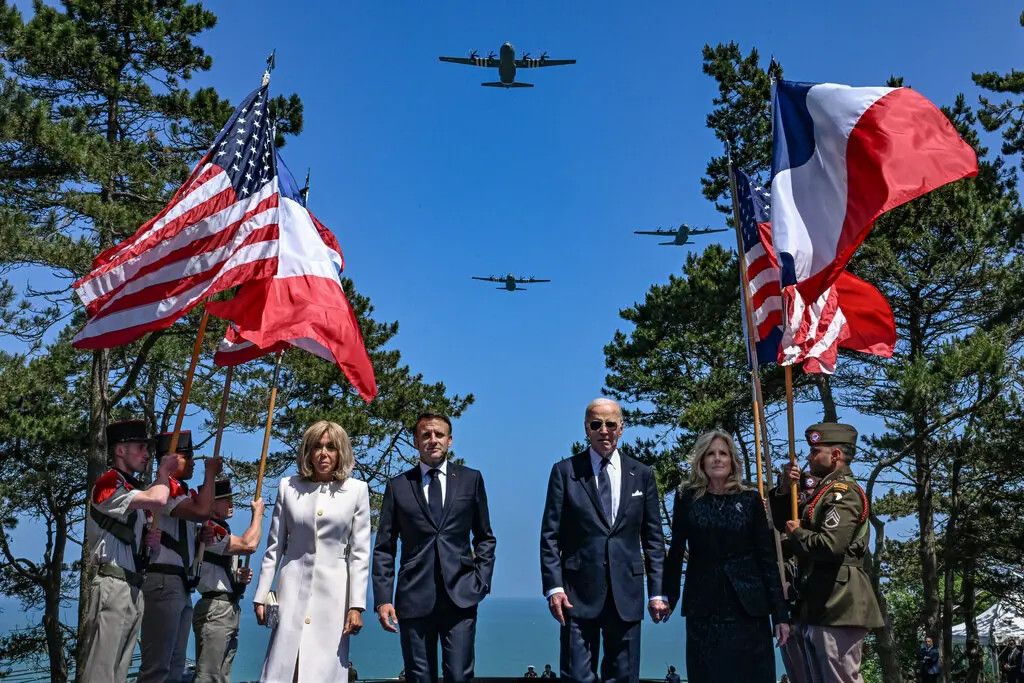
President Emmanuel Macron of France, President Joseph R. Biden, Jr. and their wives during
a D-Day commemoration last year in Normandy.Credit...Kenny Holston/The New York Times
Original article: https://www.nytimes.com/2025/05/08/world/europe/europe-ve-day-trump.html
Peter Burgess COMMENTARY
Simply put ... I have never been as concerned about tha state of the world as I am now during the 2nd term of Donald Trump as President of the United States.
Part of my concern may be to do with my advancing age, and not much else ... but in all honesty I think it is more to do with the tangible realities that I am observing.
It is no secret that I think Donald Trump is unfit to be President of anything, let alone the United States of America. A I have written many times. I crossed paths with Donald Trump on a observation visit to the casinos in Atlantic City in the 1990s and saw first hand Trump's management style. This was at the beginning of the end of Trump's involvement with Atlantic City ... an episode which tells a lot about Trump's modest operandi and moral compass.
I was born in the UK in 1940 at the beginning of WWII. Our family lived in Surbiton, Surrey, just outside London. This was near enough the center of London for life to be quite precarious. Bombs damaged our house, and every house on our street. Two houses were completely destroyed ... flattened! During the five years of the war, I saw a lot of bombing and the results of the bombing ... but I did not know that people got hurt and killed so was more excited than scared. I can only imaging, however, how my parents must have been feeling!
I remember our settee in the living room being turned upside down to give me a 'safe place to play' while enemy bombers were flying overhead.
More than 80 years later, I have memories of all of this.
My father was a schoolmaster at the Tiffins Boys School in Kingston. His main academic subject was history, but he also was responsible for the school cricket team and rugby team. My father had been too young to serve in the military during WWI and too old to be called up during WWII. During the five years of the war, students went from my father's classes and sports teams to serving in the army, navy and air force to being killed ... in a matter of months. Many of the young men getting killed were the best of the best academically and athletically ... young men that put themselves in harm's way for all the right reasons, and paid the ultimate price for their service!
My parents and I survived the war. I have some memory of May 8th 1945 when the war in Europe ended and we all celebrated!
I find it interesting to observe how the view of the war has changed over time ... how the changed view is different depending on age group and a whole lot of other factors.
As mentioned my father was a schoolmaster who taught history. I have a memory of my father giving a presentation that had the title 'The Good Old Days'. This was about 1949 when I was 9 years old. The theme of his talk was that the 'Good Old Days' was really a fairy tale, and that in reality 'now' was a better time than any time in history.I remember this quite vividly even though I was pretty young and the economic news in the UK at that time in history could only be described as dismal.
Donald Trump was born in Queen's New York on June 14, 1946, some time after the end of WWII. During most of his adult life, he has had little positive to say about the military ... not the US military nor any other!
To me, Donald Trump's character is severely compromised ... together with his family!
I worry that the power that Trump now has as the President of the United States for the second time will be used in ways that do unfixable damage to the United States and the freedom loving world. So far, the trajectory is not good, and it is not at all clear that the political 'gurard-rails' will hold!
Never did I imagine, less than a year ago, that so much so dear to so many could unravel so fast; nor that the 80th anniversary on Thursday of V-E Day, or Victory in Europe, would come with so many Europeans no longer sure whether to regard Mr. Trump’s America as ally or adversary.
I said this at the outset ... it is worth repeating:
'I have never been as concerned about tha state of the world as I am now during the 2nd term of Donald Trump as President of the United States.'
Peter Burgess
On the 80th anniversary of Nazi Germany’s defeat, echoes of tyrannies past shake a continent that is trying to find its footing in the face of President Trump’s hostility.
Written by Roger Cohen
Roger Cohen has covered the world for 45 years from more than 70 countries. He reported this article from Vichy, France.
May 8, 2025, 12:01 a.m. ET
It is disquieting to recall the moving ceremony on the beaches of Normandy that marked the 80th anniversary of D-Day 11 months ago, a celebration of the ironclad alliance between the United States and Europe, and their shared resolve to meet “the test of ages” and defend Ukraine.
That phrase from former President Joseph R. Biden Jr., standing shoulder to shoulder with President Emmanuel Macron of France, was part of an address in which he proclaimed NATO “more united than ever” and vowed that “we will not walk away, because if we do, Ukraine will be subjugated and it will not end there.”
I stood in the Normandy sunlight, musing on the young men from Kansas City and St. Paul and elsewhere who clambered ashore on June 6, 1944, into a hail of Nazi gunfire from the Normandy bluffs, and listening to words that drew a direct line between their singular courage in the defense of freedom and the struggle to defeat another “tyrant bent on domination.”
That “tyrant,” for Mr. Biden, was President Vladimir V. Putin of Russia, since absolved of responsibility for the war he started in Ukraine by President Trump, the America-first leader who has been a perennial coddler of autocrats, denigrator of NATO, and opponent of a European Union formed, in his words, to “screw the United States.”
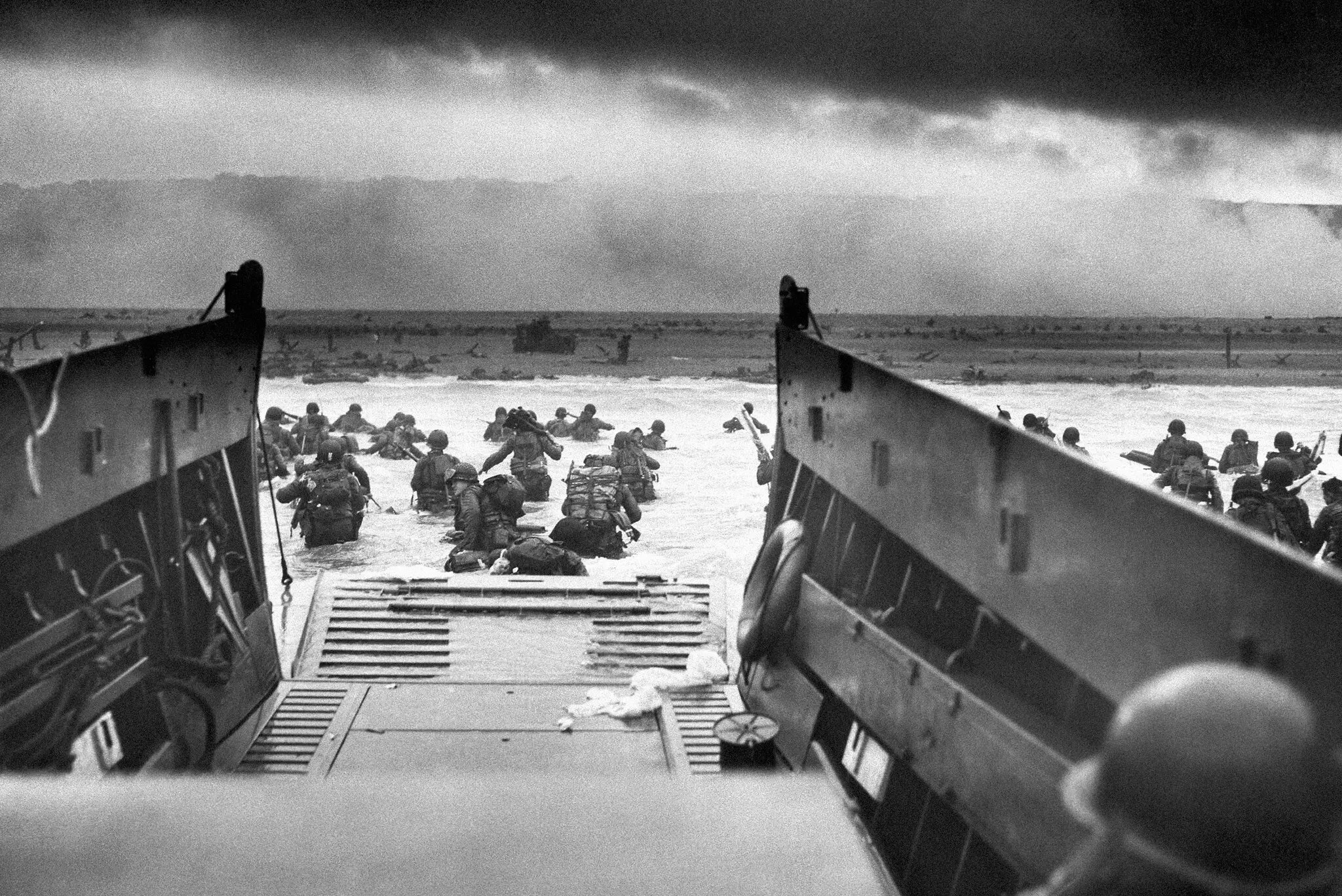
American troops wading ashore in Normandy, France, in the first wave of D-Day
invasion, on June 6, 1944.Credit...Robert M. Sargent/United States Coast Guard
“It’s night and day,” Rima Abdul-Malak, a former French culture minister, said in an interview. “Trump has occupied all the space in our heads and the world looks alarmingly different.”
Whatever else it has been beneath an avalanche of executive orders, the tumultuous start to Mr. Trump’s second presidency has seen a great unraveling of a trans-Atlantic bond that brought peace and prosperity of unusual scale and duration, by historical standards. He has taken a wrecking ball to the postwar order; what new dispensation will emerge from the havoc is unclear.
Of course, abrupt revolutions or counterrevolutions are a recurrent theme of history. Just four years before the heroic Allied landings in Normandy, contemplating the debacle of France’s almost overnight defeat to Hitler’s Wehrmacht in June 1940, Paul Valéry, a French poet and author, wrote:
“We are on a terrifying and irresistible slope. Nothing that we could fear is impossible; we can fear and imagine almost anything.”
The same could probably be said today, even in a globalized world. Certainties have dissolved, specters risen. Fear has spread, in Europe as in the United States. Europeans acquire burner phones, devoid of content, for visits to the United States, as if they were headed for Iran.
Mr. Trump’s targeting of top universities, speech protected by the First Amendment, international students, immigrants, judicial independence and truth itself in pursuit of seemingly unbridled executive power have led to talk of “a police state taking form,” in the words of Bruno Fuchs, the president of the French National Assembly’s foreign affairs committee, after a recent visit to Washington.
“This is going to be great television,” Mr. Trump said after his public humiliation of Volodymyr Zelensky, the Ukrainian president, in the White House on Feb. 28. If his America is to install autocracy, it will be one made for TV. The world, or much of it, was duly riveted at the sight of Mr. Trump accusing Mr. Zelensky of ingratitude and of risking World War lll by fighting an aggressor, at a time when he did not “have the cards.”
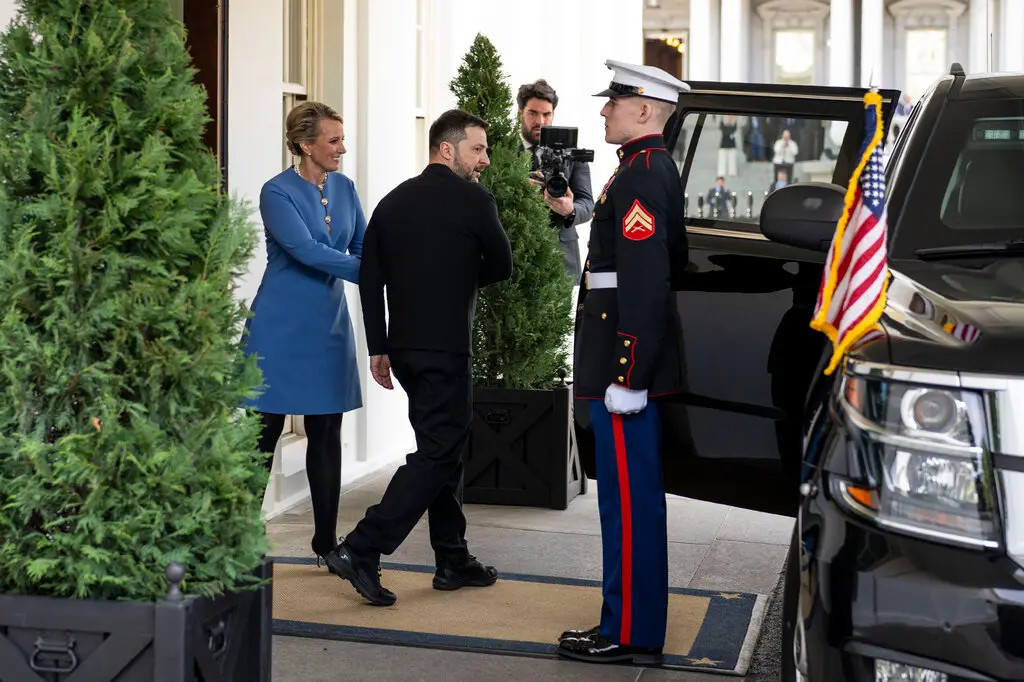
President Volodymyr Zelensky of Ukraine leaving the White House in February after
a contentious meeting with President Trump.Credit...Doug Mills/The New York Times
This presidential performance seemed to mark a breaking point for Europe, where many leaders saw it as a moral abdication.
Days later, on March 5, Mr. Macron declared: “Peace can no longer be guaranteed on our continent.”
Mr. Trump, as is his seesawing habit, has since tried to mend fences with Mr. Zelensky while declaring his dislike for him. A minerals deal, whose details remain murky, has been signed between the United States and Ukraine. It will seemingly entangle America in Ukraine for some time, even if Mr. Trump’s impatient pursuit of a peace deal has stalled.
Europe, for its part, is not waiting for Mr. Trump’s next swerve. It has seen enough to become determined to throw off what Vice President JD Vance called its “vassal” status, one in a cascade of insults aimed at NATO allies. One such ally, Mr. Trump says, should cede Greenland to him, and another should welcome absorption into the United States.
Taking office as Germany’s new chancellor, Friedrich Merz headed straight for Paris on Wednesday to meet with Mr. Macron. The two leaders are united in seeking what Mr. Merz has called “independence” and what Mr. Macron calls “strategic autonomy” from Washington, a dramatic shift. Writing in the French daily Le Figaro, they said they “will never accept an imposed peace and will continue to support Ukraine against Russian aggression.”
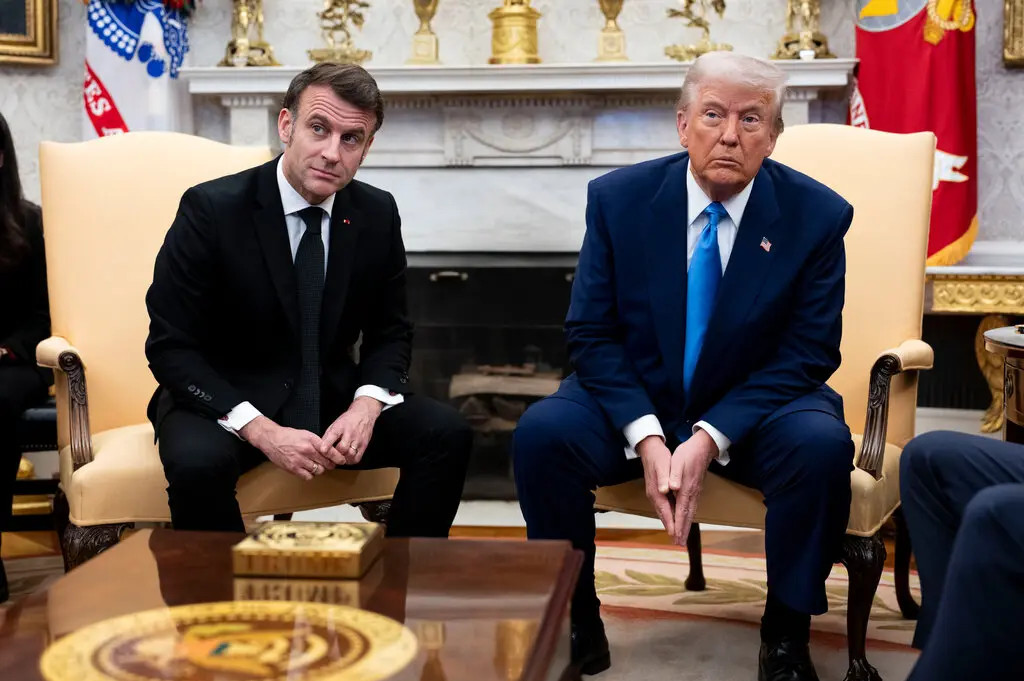
President Trump, on the right, and Mr. Macron sit side by side on yellow arm chairs in front of a fireplace. Mr. Macron with President Trump at the White House in February.Credit...Doug Mills/The New York Times
One idea being discussed, the daily Le Monde reported, is a return to the D-Day beaches 80 years after the surrender of the Third Reich for a joint photograph echoing that of François Mitterrand and Helmut Kohl, the former French and German leaders, holding hands on the World War I battlefield of Verdun.
That image from 1984, along with the photograph of Chancellor Willy Brandt of Germany on his knees in 1970 before the memorial to the Warsaw Ghetto, is one of the most powerful symbols of a unifying Europe’s rebirth.
The Franco-German alliance has always been the engine of the European Union. If it kicks into overdrive, the rearmament of Europe, as a military power but also as a guardian of the values for which America fought in World War II, seems plausible over the medium term.
“Audacity, audacity again, always audacity!” said Georges Jacques Danton, a leading figure of the French Revolution. If nothing else, Mr. Trump has shown that. People are mesmerized, reduced to amnesiac stupor, by the torrent of his outbursts.
“He’s Pavlov and we’re the dogs,” David Axelrod, the chief strategist of Barack Obama’s victorious presidential campaigns, told me recently.
Europe will have to respond with a different kind of audacity if it is to develop strategic might to match its longtime status as an economic giant. Germany, obliged by history to demilitarize, but conscious that this posture has run its course, almost certainly holds the key to any such transformation. It faces the immense challenge of internalizing the consequences of a new world of raw power where rules and the law seem destined, at least for the moment, to count less.
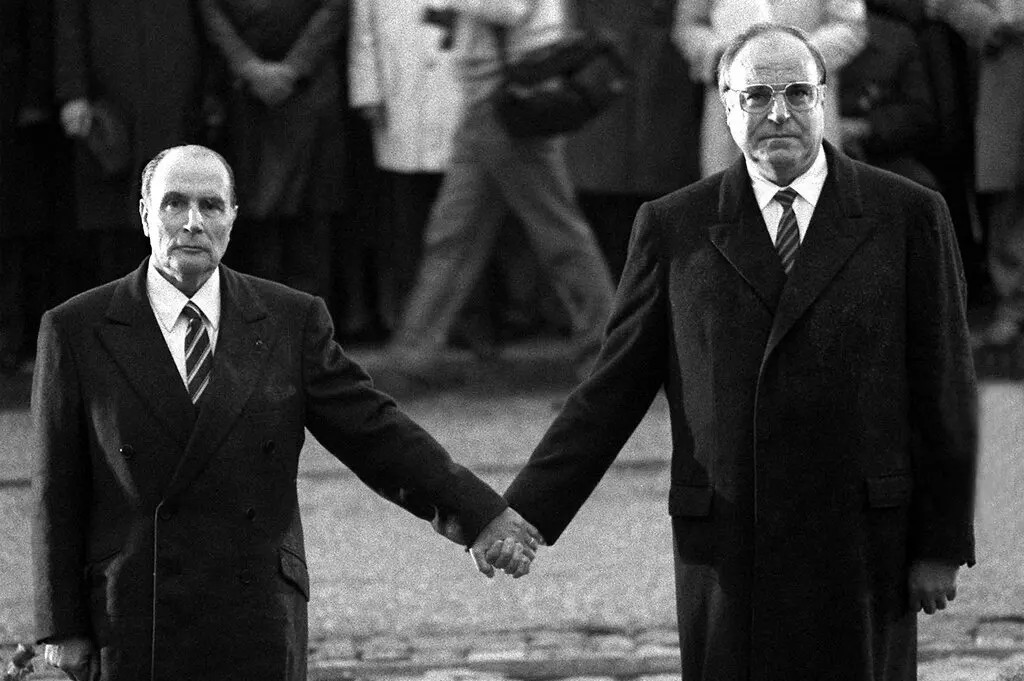
German Chancellor Helmut Kohl, right, with President François Mitterrand of France in 1984 at a ceremony for soldiers killed in the two world wars.Credit...Marcel Mochet/Agence France-Presse
But Europe is scarcely united, whatever the resolve in Paris and Berlin. The nationalist, anti-immigrant, anti-climate-science, anti-transgender wave that swept Mr. Trump into office last year is also potent across a continent where it has empowered Viktor Orban in Hungary and Giorgia Meloni in Italy, among others.
Rising parties of the far right, including the Alternative for Germany, or AfD, and the National Rally in France, reflect the anger of Europeans who feel invisible, isolated, poorer, and ignored by urban elites, just like their counterparts in America.
There is a fundamental difference, however. Much of Europe knows how fragile freedom is, how dictatorship is possible, and mass murder along with it, with a collective memory of the horrors of the 20th century.
It was precisely to overcome this collapse into brutality, racism and genocide that the United States, far removed from Europe but conscious that its fate implicated all humanity, sent its young men to fight their way ashore in France in 1944. In the American cemetery in Normandy, the 9,389 graves are one sobering measure of their devotion.
In the days, weeks and years after Paul Valéry’s reflection in 1940, France did indeed cede to the unthinkable. I write now from Vichy, the small town in central France from which the authoritarian regime of Marshal Henri-Philippe Pétain ruled a rump France, collaborated with its Nazi overlords and deported more than 70,000 Jews to their deaths in Hitler’s camps.
Such was the French shame at Vichy, and the shredding it represented of the values and ideals of the Republic, that it took decades to confront the truth in full. The name of this pleasant spa town, far from the Normandy beaches, will be forever associated with ignominy.
At the conclusion of “Vichy France,” his magisterial book that brought France to a deeper understanding of its darkest hour, Robert Paxton, the American historian, writes: “The deeds of occupier and occupied alike suggest that there come cruel times when to save a nation’s deepest values one must disobey the state. France after 1940 was one of those times.”
Those words seem worthy of particular reflection today, eight decades after peace returned, with decisive American help, to a shattered European continent.
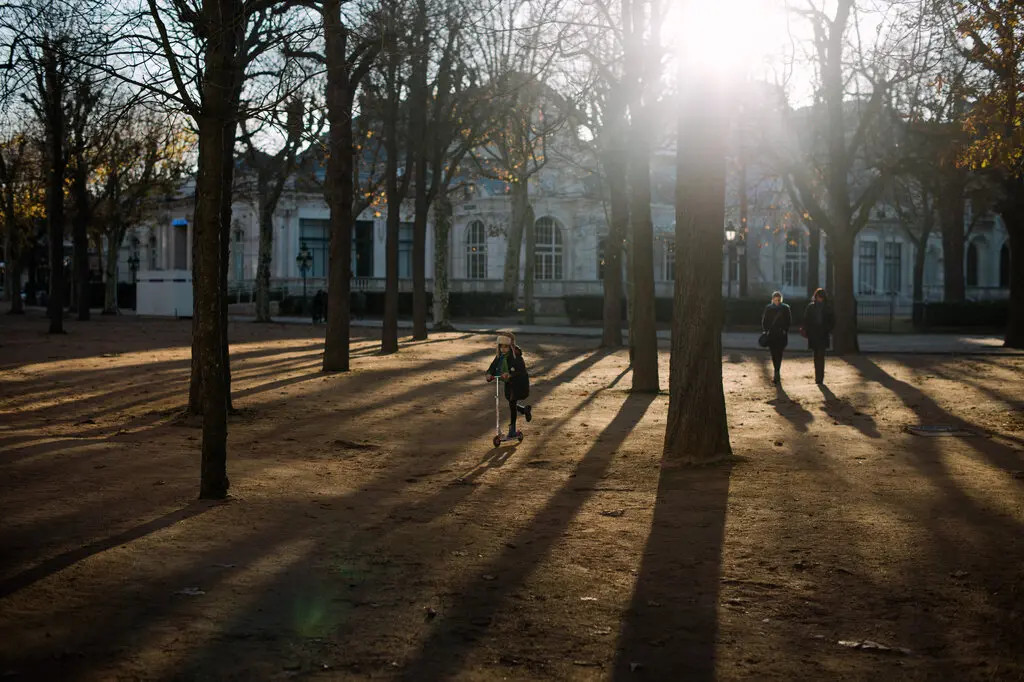
Vichy, a resort town in central France, was the seat of a repressive, collaborationist French government during World War II.Credit...Dmitry Kostyukov for The New York Times
Roger Cohen is the Paris Bureau chief for The Times, covering France and beyond. He has reported on wars in Lebanon, Bosnia and Ukraine, and between Israel and Gaza, in more than four decades as a journalist. At The Times, he has been a correspondent, foreign editor and columnist.
The Latest on the Trump Administration
- Energy Star Program: The Environmental Protection Agency plans to eliminate the popular energy efficiency certification for dishwashers, refrigerators, dryers and other home appliances, according to agency documents and a recording of an internal meeting.
- President Trump and Mark Carney Meet: The president played nice when he came face-to-face with the new prime minister of Canada, the country he has spent months belittling.
- Venezuela’s Opposition Leaders Flee: Five top Venezuelan opposition figures who had been sheltering for 412 days at the Argentine diplomatic residence in the capital, Caracas, have left the country and are now in the United States, according to Secretary of State Marco Rubio.
- Turning Back the Economic Clock?: The president thinks he can return America to manufacturing glory — but the cycles of economic history are hard to break.
- Britain’s Failed Rwanda Deportation Deal: The United States is said to be in talks with the African country about taking in expelled migrants. There may be lessons in London’s experience.
- Strikes on Houthi Militants: The United States and Houthis in Yemen reached a deal to halt American airstrikes against the group after the Iranian-backed militants agreed to cease attacks against American vessels in the Red Sea, President Trump and Omani mediators said.
- California’s High-Speed Rail: Trump said that the federal government will not pay for the state’s high-speed train, another potential wrinkle in a troubled project that has repeatedly blown past its budget and completion timeline since voters approved funding in 2008.
- Normalizing Tariffs: By threatening gigantic tariffs and then walking them back, the president seems to have increased the acceptance, at least in some circles, of the significant tariffs that remain in place.
- Restaurants Are Hard Enough to Run. Try Doing It With Your Mother.
- The Best Books of the Year (So Far)
- Looking for Magical Landmarks in ‘Harry Potter’ Glasses